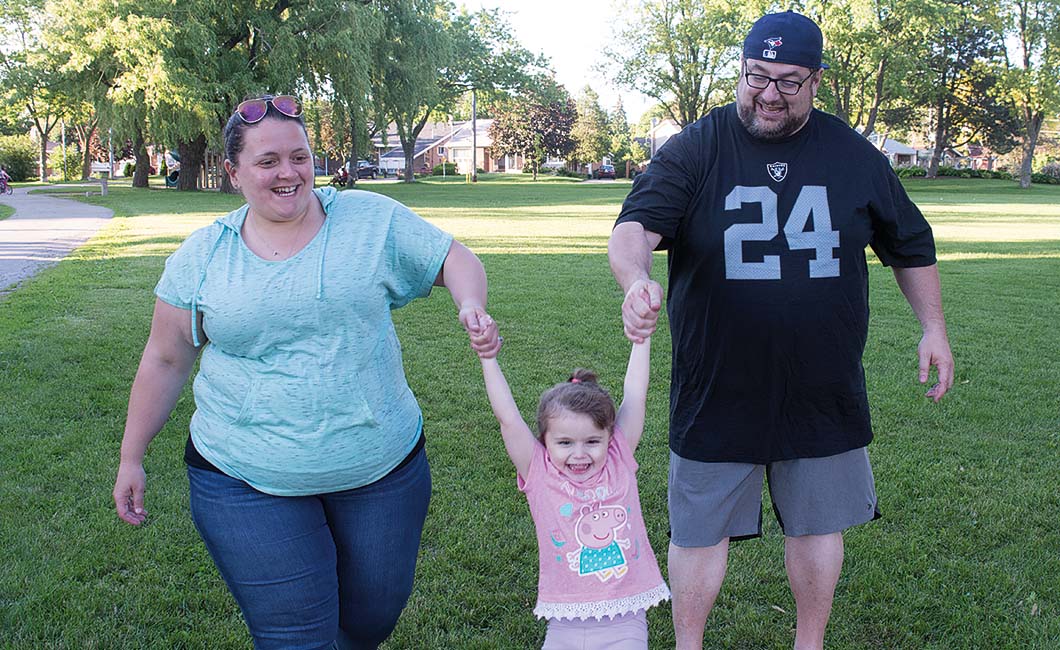John Rutledge felt overwhelmed. He had experienced the sleepless nights, changing diapers, and finding that one bit of furniture not yet “child-proof.” After his daughter Ava was born, Rutledge became even more stressed and anxious, to a point that he knew something wasn’t right.
“We were in the doctor’s office and it felt like I was in free fall,” Rutledge said.
The 43-year-old business development manager and his wife, Amy Moledzki, had just found out their little girl was diagnosed with severe autism.

John Rutledge with daughter Ava. (D.J. Llewellyn/Toronto Observer)
“There is nothing worse than wondering if the hopes you have for your child will ever happen,” Rutledge said.
It was also in that moment six months ago when Rutledge could no longer ignore the diagnosis he’d received; the doctor said he had paternal post-natal depression (PPD).
“About a year ago I had lost my job so that added to the stress of what was already going on with Ava. Things just kept snowballing until I had to see somebody. If not for me, then for my daughter,” Rutledge said. His wife kept pushing him, too.
“For a long time I kept telling him, ‘Go see a doctor about this.’ I saw that he felt hopeless and I was trying to be as supportive as I could, but it was becoming very difficult,” Moledzki said.
PPD is post-partum depression that affects men. A recent study published in the American Journal of Pediatrics showed that men are 68 per cent more likely to become depressed within the first five years of becoming a father. While the “daddy blues” might last a short time, PPD can last for months, or even years.
When Rutledge lost his job, the struggle to care for his wife and child became too much for him to handle on his own.
Dr. Andrew Howlett is a psychiatrist at St. Joseph’s Health Centre and Mount Sinai Hospital in Toronto and a founder of the Father’s Mental Health Network. He helps men suffering from PPD and noticed there was an opportunity to meet a growing need.
“A lot of academic services offer these mental health services for women, but never really looked at offering them to men,” Howlett said. “Many new dads feel isolated. Not a lot of focus is on those men who suffer it.”
Howlett explained that treatment starts with a consultation to determine the kind of assistance fathers that are struggling might need. Rutledge’s doctor prescribed Zoloft, an anti-depressant pill. Rutledge takes it every morning during breakfast to stabilize his mood.
“Now that I’m on medication I don’t get so upset like I used to. I don’t get impatient and no longer have the sleepless nights,” Rutledge said.
Medication is just one method used to treat patients. According to Howlett, psychiatrists are still learning about the effectiveness of other types of therapy.
“IPT (inter-personal psychotherapy) has been shown to be effective in women but it hasn’t really been studied in men. It focuses on conflict and role-reversal while CBT (cognitive behavioural therapy) focuses on behaviour and thoughts,” Howlett said.
PPD affects relationships between these men and their families. While Rutledge was struggling to get back on his feet, his wife had to try to keep their relationship together and care for their daughter.

Amy Moledzky with daughter Ava. (D.J. Llewellyn/Toronto Observer)
“I felt very alone and had all this pressure on me,” she said. “Somebody had to do something. He stopped taking care of himself. He was fragile and had next to no motivation to do anything. It caused us to resent each other,” Moledzki said.
Though he felt forced to stay in his bed, and apathetic towards so much in life, it seemed that Rutledge was motivated for someone.
“No matter how awful he felt, he was always an amazing father. Even if he hadn’t shaved in God knows how long, Ava and her therapy was always his priority,” Moledzki said.
Howlett emphasized that bond between father and child helps to make the treatment successful.
“Parents are driven to do the best they can, so this is an opportunity to help men that will do the work,” Howlett said.
Rutledge hasn’t needed much therapy. He said that he talks to his doctor and his medication helps him. He encourages other dads speak to their doctors and not be silent.
“My days have gotten a lot easier with the help. I’d tell anybody dealing with this illness to get help, even if it takes a while. Nobody’s Superman,” Rutledge said.
His wife sees the difference in her husband. The smile on Ava’s face when her father arrives home suggests she does, too.
“He can’t wait to get home from work to play on the floor with Ava and spend time with his family. He’s more like himself again,” Moledzki said.

